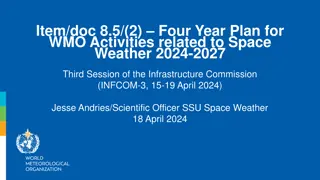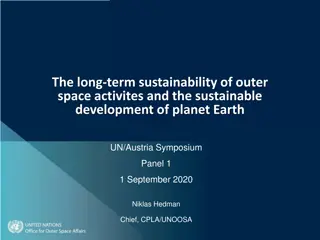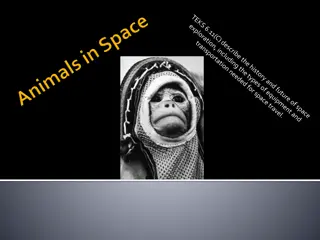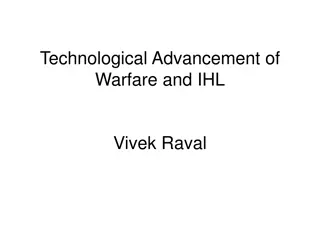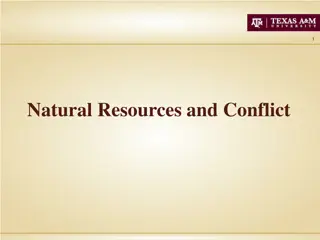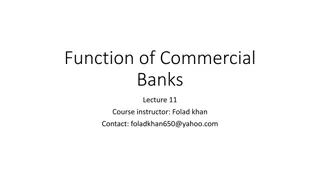Managing Conflicts in Commercial Space Activities
Explore the challenges arising from the commercialization of space activities, the shift in focus towards sustainable space use, and the need to harmonize modern commercial ventures with traditional space laws to prevent conflicts among diverse space actors.
Download Presentation

Please find below an Image/Link to download the presentation.
The content on the website is provided AS IS for your information and personal use only. It may not be sold, licensed, or shared on other websites without obtaining consent from the author.If you encounter any issues during the download, it is possible that the publisher has removed the file from their server.
You are allowed to download the files provided on this website for personal or commercial use, subject to the condition that they are used lawfully. All files are the property of their respective owners.
The content on the website is provided AS IS for your information and personal use only. It may not be sold, licensed, or shared on other websites without obtaining consent from the author.
E N D
Presentation Transcript
Commercial Space as a Source of Conflicts and Commercial Space as a Source of Conflicts and the Need for Space Pluralism the Need for Space Pluralism By Maria Manoli Research Assistant Institute of Air and Space Law McGill University
Roadmap of the presentation 1. Commercial Space: Definitions 2. What is the problem and how was it realized 3. Traditional purposes of space law/activities and current contradictions 4. The current state of international space law 5. What is being done to accommodate all space actors 6. What needs to be done
Commercial Space Space activities that entail commercial character and begin to dominate in the whole range of space-related disciplines Significant number of conflicts in the international legal and academic community Necessity to consider the needs and intentions of both traditional and modern space actors, together with their perceptions as to what modern space law should consist in
The Problem During the last decade, the United Nations (UN) Committee on the Peaceful Uses of Outer Space (UNCOPUOS), the UN Conferences of the Peaceful Uses of Outer Space (UNISPACE), and a significant number of UN General Assembly sessions have shifted the focus of their discussion and concern toward the sustainable use of outer space as far as space activities are concerned. Private investment in the field of space activities has significantly increased in the past decade and was estimated to have reached US$ 10 billion by the end of 2015 whereas public investment is limited to 20% of the total contribution. Traditionally, outer space has been regarded as an area used by States in a peaceful manner in order to serve terrestrial needs and benefit humankind. Main Question: In which way should commercial space activities be uniformly regulated in order to achieve sustainability by ensuring consistency with the major and long- standing principles provided under the existing space law regime so as to avoid conflict.
Traditional perceptions on the uses of outer space Space activities that use outer space for the benefit and in the interest of all countries Freedom of exploration and use of outer space in a non-discriminative manner International cooperation Bin Cheng: Article I of the Outer Space Treaty asserts a general freedom of scientific investigation in outer space. Christol: 1987 - the potential emergence of new space actors calls for the conscious development of a workable international legal regime , if the space environment is to be used for the benefit of the general community and its individual members
In the present circumstances, the strength of these principles, however, has to be viewed from the perspective of the influx of new space actors, which is occurring as a consequence of the democratization of outer space. - Judge Manfred Lachs in 1963 referred to the international cooperation in the realm of space activities as a crucial factor for coexistence.
Critical aspect of the question Inherent State-oriented nature of international space law Difficult to promote commercial space activities in a sustainable manner In reality, States are the principal subjects of international law while individuals have only limited international legal personality The ambivalent linkage between States and private space actors features important dimensions in light of the mechanisms and general principles of lex spatialis
Culmination of the complexity of the problem Actual attempts: A United States citizen engaged in commercial recovery of an asteroid resource or a space resource shall be entitled to any asteroid resource or space resource obtained, including to possess, own, transport, use, and sell the asteroid resource or space resource obtained (US Commercial Space Launch Competitiveness Act) Blatant (?) contradiction: The US remains to be a State party to the Outer Space Treaty, which prohibits the appropriation of parts of outer space, including celestial bodies.
What is Being Done Preparatory Meeting for the High Level Forum on UNISPACE+50 - November 2015 Need to regulate space activities from a perspective that takes into account the cross-sectoral impact of integrating economic, environmental, social, policy and regulatory dimensions of space in pursuance of global sustainable development UNISPACE+50 will be held in 2018 with the main purpose of examining the issue of global governance by taking into account new Sustainable Development Goals , and the presence of modern space actors and space activities in the realm of commercial space .
52nd Session of the UNCOPUOS The space agenda is evolving and becoming more complex, not least considering the broader concept of space security, as well as the expanding commercial space sector. The nature of space activities is evolving to meet those realities. The development of international mechanisms such as guidelines, codes and other confidence-building measures are reflective of this new environment
What Needs to Be Done? What Needs to Be Done? Interdisciplinary approach Indeed UNCOPUOS suggests the factors below to be taken into account (a) space economy (b) space society (c) space accessibility (d) space diplomacy
Space Economy : the full range of activities and use of resources that create and provide value and benefits to human beings in the course of exploring, understanding and utilizing space Space Society: is a term used in a futuristic manner, and refers to the functions of societies that regard space technologies as one of the core means for their development Space Accessibility: concept that summarizes the demands of traditional space law, and refers to the way in which outer space is currently regulated so that it can be used in accordance with the traditional concepts of space law Space Diplomacy: refers to the examination of national space policies and the way in which they influence decision-making processes
Thanks for your Attention! Thanks for your Attention!
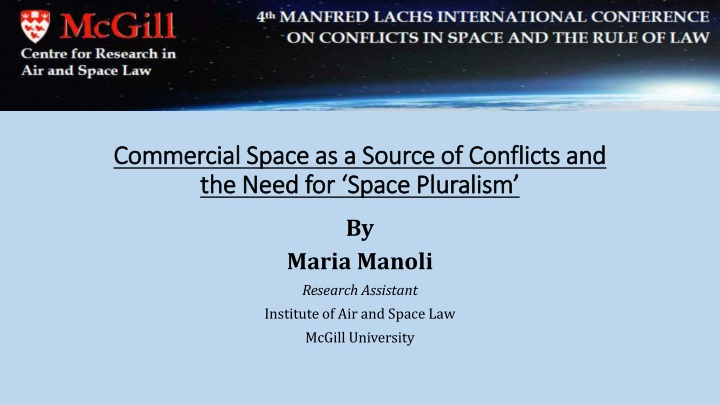


![Read⚡ebook✔[PDF] Linking the Space Shuttle and Space Stations: Early Docking Te](/thumb/21519/read-ebook-pdf-linking-the-space-shuttle-and-space-stations-early-docking-te.jpg)
![READ⚡[PDF]✔ Emerging Space Powers: The New Space Programs of Asia, the Middle Ea](/thumb/21554/read-pdf-emerging-space-powers-the-new-space-programs-of-asia-the-middle-ea.jpg)
